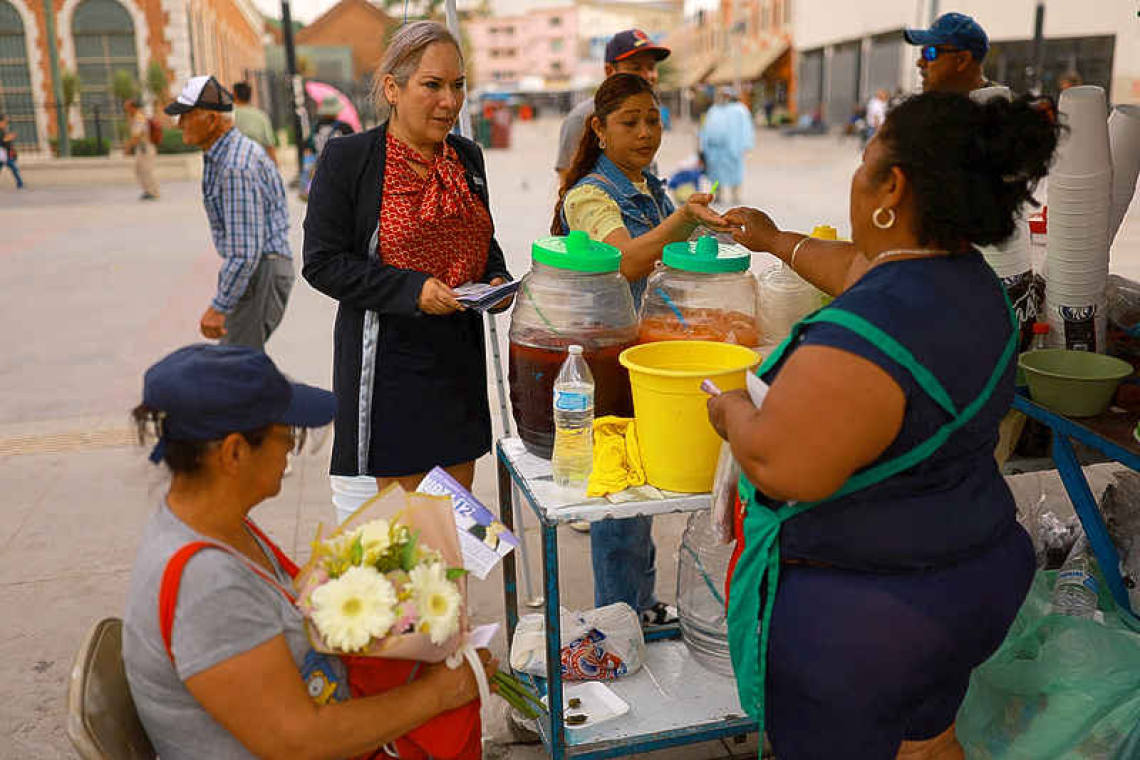Silvia Delgado, former defense attorney for Sinaloa Cartel boss Joaquin "El Chapo" Guzman in 2016 and current candidate for criminal judge, distributes campaign materials ahead of Mexico's first judicial elections, to be held on June 1, in Ciudad Juarez, Mexico, May 12, 2025.
CIUDAD JUAREZ, Mexico--When residents in the state of Durango vote in Mexico's first judicial elections next weekend, Leopoldo Chavez will be on the ballot for federal judge - despite the nearly six years he served in a U.S. prison.
Chavez was convicted on drug offenses: for smuggling over 4 kilograms of methamphetamines in 2015. Durango is part of Mexico's Golden Triangle, a cartel-controlled region growing marijuana and opium poppies.
"I've never sold myself as the perfect candidate," Chavez said in a video he shared on Facebook. He said he had nothing to hide and had served his time. He declined to comment to Reuters.
In the nearby Pacific coast state of Jalisco, Francisco Hernandez is running to be a criminal magistrate even though the last time he served as a judge he was dismissed by the Federal Judiciary Councilafter an investigation into allegations of sexual abuse and corruption.
He told Reuters the accusations were "slander and defamation." "Let the people judge me," he said.
And in Nuevo Leon, Fernando Escamilla is hoping to become a federal criminal judge and says the legal work he did advising lawyers for members of the ultra-violent Los Zetas cartel should not be held against him. His knowledge of extradition law, on which he advised the capos, made him an asset, he told Reuters in an interview.
"Does being an advisor on international or extradition law give you a bad public reputation? I don't think so, since that's the only thing that demonstrates that you have the ability and knowledge to handle these types of situations," Escamilla said.
Ahead of the elections on June 1, civil organizations, judge associations and some Mexican lawmakers are raising serious concerns about a vote that critics warn could jeopardize the country's rule of law. The controversial judicial overhaul was proposed by leftist former President Andres Manuel Lopez Obrador and supported by his protege, President Claudia Sheinbaum. Both said it would root out corruption in Mexico's flawed judiciary and allow the people to decide who should be a judge.
Around 5,000 candidates are vying for more than 840 federal positions, including all Supreme Court justices.But with the vote just over a week away, Mexican rights group Defensorxs says it has identified about 20 people vying for positions that have criminal indiscretions, corruption allegations against them or past links to cartels, including a defense lawyer who represented drug kingpin Joaquin 'El Chapo' Guzman.
An analysis by the Judicial Electoral Observatory (OEJ), made up of non-profit organizations, has also flagged more than 130 candidates with a high probability of winning in the absence of opposing candidates, and criticized problems in the design of complicated ballots that feature hundreds of names and may confuse voters. The reform, passed in September 2024, was criticized by then U.S. ambassador Ken Salazar, who served during the administration of President Joe Biden, as a threat to Mexican democracy.
Critics say the reform, one of the most broad-ranging to be attempted in recent years by any country in the Western Hemisphere, risks removing checks and balances on the ruling Morena party and allowing organized crime groups greater influence over the judicial system.
The reform reduces the number of Supreme Court judges to nine from 11, cuts the length of their terms to 12 years, abolishes a minimum age requirement of 35, and halves necessary legal practice to five years. It also scraps some benefits for judicial workers and creates a five-person disciplinary tribunal, which critics argue is insufficient to oversee a 50,000-member judiciary.
Defensorxs president Miguel Meza said that the candidates his organization had flagged revealed grave flaws in the government vetting system, which was meant to verify eligibility criteria including: Mexican citizenship by birth, a bachelor's degree in law, "good reputation," and a record clean of serious crime.Meza said his organization has been making its way through the list of candidates and had identified other problematic names that they had yet to publish.
Meza said aspiring judges were apparently not screened for foreign convictions or who they had legally represented. He put much of the problem down to rushing the election.







